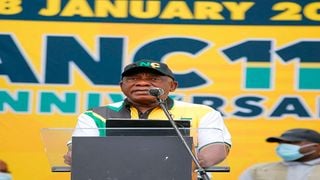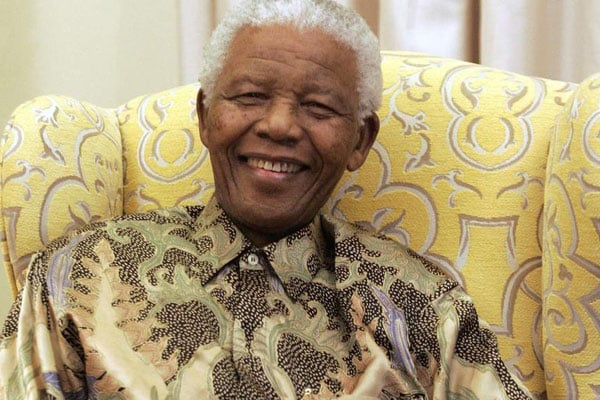Breaking News: President Ruto declares May 10 public holiday

South Africa's President and African National Congress (ANC) party's President Cyril Ramaphosa speaks during the ANC's 110th anniversary celebrations at the Old Peter Mokaba Stadium in Polokwane, on January 8, 2022.
| AFPNews
Prime
ANC, Africa's oldest liberation movement, is 'broke'
What you need to know:
- ANC veteran Mavuso Msimang, 60, recently severed ties with his lifelong political 'home' in a scathing three-page resignation letter delivered to ANC leaders on Wednesday.
- Former President Thabo Mbeki, has also publicly distanced himself from his party, telling a university audience in August that he would not campaign for the ANC in the 2024 elections.
The African National Congress (ANC) is many things: Africa's oldest liberation movement, Nelson Mandela's anti-apartheid party and South Africa's ruling party. Now it is broke, giving it an embarrassing profile.
This week, as before, creditors were knocking on the party's doors at its Johannesburg headquarters, demanding payment for services rendered that are years overdue.
Among the unpaid bills hanging over the party are costs incurred five years ago, during the last national elections.
Now another round of national elections is looming in early 2024 -- in which, opinion polls warn, the ANC could lose its overall majority for the first time since the dawn of democracy in South Africa in 1994.
One of the problems that has led to this is largely one of internal governance. The 'party of Mandela' has been riven by infighting, with officials accusing each other of corruption. A recent Harvard University report found that South Africa's ills, including inequality and a 'failing state', could be largely blamed on the ANC.
Local and international attitudes towards the ANC have undergone a major metamorphosis since the heady days of its national hegemony and unbridled international adulation in the mid-1990s.
In next year's elections, expected around the end of April, enthusiasm may be at its lowest. In 2021, it had fallen to less than half of the total vote in municipal and local government elections.
Since 2021, South Africa, which already had systemic economic problems before the Covid-19 pandemic and barely recovered after it, has moved closer to a complete collapse of core government services.
The country's economic woes may be directly linked to those of the ruling party. In South Africa, party political funding comes in part from the government, which allocates funds from the national budget to be distributed by the Independent Electoral Commission (IEC), mainly to help smaller parties compete on a level playing field.
The ANC received about $3.7 million from the IEC. In 2022, the commission distributed about $8.66 million to political parties on a proportional basis, according to the number of MPs each party has in parliament.
The ANC needs more, as do other parties. Its other funding comes mainly from three sources: billionaires Patrice Motsepe and Martin Moshal and the wealthy Oppenheimer family, who together have donated over $5 million to the ANC in the last two years, and have made other donations to other parties such as the Democratic Alliance, the EFF, the ANC's arch-rivals the Inkatha Freedom Party, ActionSA and even the right-wing Freedom Front Plus.
Not all parties have disclosed their sources of funding as they should, but it is known from official figures that each political party -- there are about 20 active parties -- had a small group of donors who contributed 50-70 per cent of their total donations, including the ANC.
In the case of the ANC, the largest recent donor has been the Batho Batho Trust, set up by a tribal sub-group using funds from mines and mining rights owned by the clan. The organisation has contributed almost a third of all funding to the ruling party, giving around $2.7 million since 2021. Established in 1992, Batho Batho has strong links with the ANC and had Nelson Mandela as its first chairman.
The ANC also has investments in joint ventures that bring additional money into the party's coffers.
But all sources combined still leave the ANC struggling to pay for election campaigns -- and even its staff between elections.
Aside from old debts coming back to haunt the ruling party, the ANC has recently suffered other embarrassments, including being collectively and publicly hauled over the coals by one of its elders and veterans.
In a scathing three-page resignation letter delivered to ANC leaders on Wednesday, 60-year-old ANC veteran Mavuso Msimang severed ties with his lifelong political 'home'.
Msimang, deputy president of the ANC Veterans' League, a powerful sub-group in the ruling party, said: “For several years now, the ANC has been wracked by endemic corruption, with devastating consequences on the governance of the country and the lives of poor people, of whom there continue to be so many.”
The ANC, he said, was “seen to have a high tolerance threshold for dishonesty” and its “deployment of unsuitable people” accounted for “the government’s deplorable levels of service to the public”.
“Over four million people live in shacks that are referred to as ‘informal settlements’,” he added, with “beggars” now to be found “in every town”, people “who have been forced to sacrifice their identity in part because of my party’s successive failures”.
Another party stalwart and leader, former president Thabo Mbeki, has publicly distanced himself from his party, telling a university audience in August that he would not campaign for the ANC in the 2024 elections.
But responding to mounting internal criticism, ANC Secretary-General Fikile Mbalula criticised those he accused of "de-campaigning" the ANC ahead of critical elections, saying they should "stop attacking ANC".
“We call on them to work with the structures of the organisation. All of us availed ourselves to the veterans’ counsel and direction, [but] they are attacking and de-campaigning our movement, as we face difficulties,” he said of the situation after receiving Msimang's resignation letter.
The ruling party was actively dealing with party "renewal matters", he said, adding that “at least 89 implicated people (within the ANC) will face disciplinary processes.”
The veteran's stinging criticism follows similar views from others in the party, some driven by the ongoing factionalism between supporters of President Cyril Ramaphosa's "reform programme" for his troubled party and those who support former president Jacob Zuma.
But most of the criticism from senior members of the ruling party itself has centred on issues of corruption, poor governance and failure to deliver on the 'liberation promises'.
Internal dissatisfaction with the ANC's leadership and lack of fiscal and other discipline has been rumbling for years, with the current veterans' league having a contentious and anxiety-ridden conference as far back as 2016.
But the ANC was also under attack from within over broader governance and related issues, leading to its loss of dominance in key centres such as Johannesburg and Pretoria.





